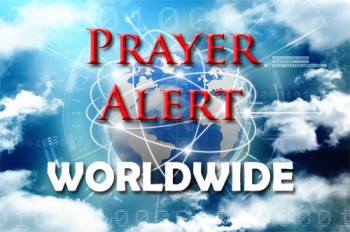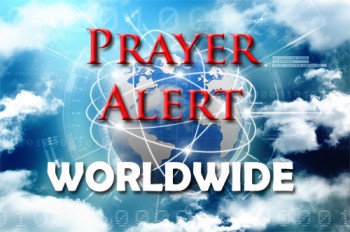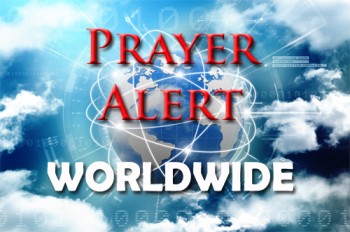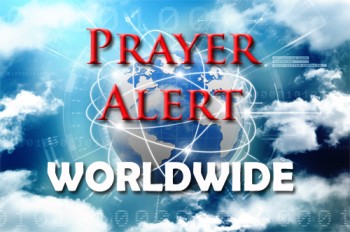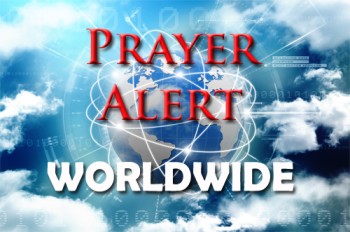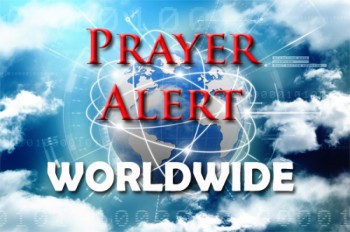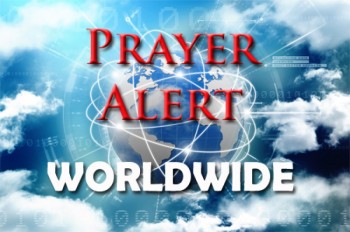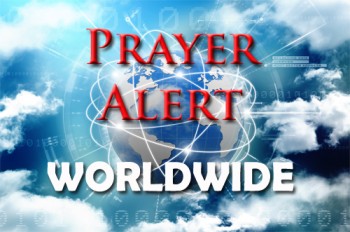Displaying items by tag: Africa
Reaching a million in a young continent
Over 60% of Africa’s population is under the age of 25; over half of them are under 16. Christ for all Nations (CfaN) is committed to reaching the children and youth of Africa. In the last few decades, CfaN has built a very strong follow-up system with local churches. During the last 18 months their Bootcamp and CfaN team members have conducted an astonishing number of children’s campaigns. They have now produced a special booklet just for children, with the same powerful Gospel message in language that they can understand, read and reread, building the same first steps in faith that adults do. The What’s Next? booklet is already in English, Xhosa, Zulu, Congolese French, German, Afrikaans, Haitian Creole and Kirundi. CFaN is moving as fast as possible to translate it into the local language in each place where there will be an evangelistic campaign in 2022. They plan to reach a million children.
Sudan: military dissolves government, arrests leaders
The Sudanese military have declared a state of emergency and dissolved civilian rule, an event which many had feared. They have been at odds with civilian leaders since Omar al-Bashir was overthrown two years ago. time. Recently there was a pro-military sit-in outside the presidential palace, then a week later counter-protests were held, supporting the civilian government. Now more protests have been called by pro-democracy groups to ‘counter the military coup’. Sudan could be set for yet another period of showdown between the armed forces and the people. The country has made huge strides in normalising ties with the West and unlocking much-needed funding. The promise of democracy has kept many allies hopeful. But that is at risk now. The World Bank and the US have stopped aid to Sudan, and the African Union has suspended Sudan from all its activities. See
Nigeria: ‘all we have left is God and hope’
Fulani herdsmen attacked a worship service at an evangelical church in Kachia county, killing one and wounding many others. Then they destroyed dozens of homes in two villages, wounding more Christians and killing thirty. ‘Our hearts are filled with pain, fears, bitterness and disappointments,’ said a survivor. ‘The trauma, the macabre series of murders, the daily kidnappings, attacks on farmers and destruction of crops, the burning of houses, churches and humans alive, the mass burials. All we’ve got left is God and hope.’ A few days earlier an agitated mob hacked Rev Yohanna Shuaibu to death and burned down his home, church and school over the killing of a woman by a man they believed had converted to Christianity. Pastor Shuaibu had built a school for indigenous Christian children denied an education because of their faith. May God comfort all the bereaved, heal the physically and emotionally injured, and provide for all the homeless.
Ethiopia: unprecedented malnutrition
The UN warned of ‘unprecedented’ malnutrition among women and children as fears of mass starvation grow in Ethiopia’s embattled Tigray region. Ethiopia has expelled seven senior UN officials, including the head of UNICEF, for ‘meddling’ in its affairs. They suspended the operations of Doctors Without Borders and the Norwegian Refugee Committee, accusing them of spreading ‘misinformation’ about the war. Last November the prime minister sent troops to topple the Tigray People’s Liberation Front (TPLF) in response to its attacks on army camps. UN aid chief Martin Griffiths reported a three-month ‘de facto blockade’, restricting aid to 10% of what is needed for six million people. 400,000 people have ‘crossed the threshold into famine’. Federal officials blame TPLF for obstructing deliveries, but the US State Department said access to essential supplies and services was ‘being denied by the Ethiopian government’ and there were ‘indications of a siege’.
Nigeria: secular Sharia?
The idea that Nigeria is well-intentioned but under-resourced to contain religious violence is incomplete. The government may be under-resourced, but is not blameless in the matter of sectarian violence. Government forces have fought to quell the violence in some instances, but in others they exacerbated the problem if not created it in the first place according to a report by International Christian Concern. The report considers ways which Nigerian states contribute to discrimination and violence against Christians: in particular, twelve northern states which adopted Sharia criminal law, leading to problems for Christians in the region and impacting their ability to participate as equal members of society. Using Sharia to adjudicate on criminal matters has done significant real-world harm, and the departure from secularism has harmed Christians in northern Nigeria.The report recommends the US government to establish an official stance against non-secularism in northern Nigeria, rework aid delivery to Christians, and appoint a special envoy to address each region’s issues.
Eritrea: releases of prisoners followed by arrests
A wave of releases of Christian prisoners was not a change in policy, as had been hoped. It has been followed by the arrest of eight Full Gospel Church leaders, and 35 Christians were detained after raids on two prayer meetings. Three of the Full Gospel leaders are pastors in their seventies. Police took Pastor Araya (75) and Pastor Okbamichael (74) from their homes in the middle of the night and placed them in a maximum-security interrogation centre. Pastor Gebreab (72) was sick and placed under house arrest until he recovers enough to be incarcerated. No reason was given for their arrest. Also following the discovery of a list of Christian contacts, fifteen men and women from different churches in Asmara have been re-arrested. Having been imprisoned for their faith for between five and 16 years, they had been released last summer.
Ethiopia: Thousands imprisoned and butchered
Soldiers occupying Tigray are ethnically purging native people – detaining in concentration camps and massacring dozens. In Humera soldiers are going ‘door-to-door’ searching for ethnic Tigrayans in the campaign of slaughter with occupying soldiers saying ‘exterminate all Tigrayan residents in the city’. Last week Tigray forces attacked a hospital and religious site with artillery, killing civilians and looting medicine. See Médecins Sans Frontières / Doctors Without Borders have 800 staff treating war-wounded people, supporting five hospitals and running dozens of mobile clinics. See US officials recently reported fighters looting warehouses, trucks and causing destruction in every village visited. On 7th September the UN said 100 trucks of food and non-food items must enter Tigray daily to meet humanitarian needs. But less than 500 trucks have arrived since July. Over five million need emergency assistance and 400,000 face famine-like conditions. That number could get higher.
Guinea: Soldiers plan a transitional government
On September 6th soldiers seized power, dissolved the government and detained Guinea’s President Conde. Colonel Mamady Doumbouya, a former French legionnaire, and his army want a transitional government and a new constitution. He announced on TV that all land and air borders are shut, the government is dissolved and ‘Guinea no longer entrusts politics to one man, we will entrust it to the people.’ Conde's popularity plummeted after he changed the constitution so that he could stand again. This caused protests killing dozens. Doumbouya released 80+ political prisoners who had campaigned against the constitutional change and met the heads of Guinea’s various military branches to unify the armed forces under his command. West Africa’s regional bloc (ECOWAS) suspended Guinea’s membership on 7th September and sent a high-level mission to Guinea on the 9th to re-examine its position. ECOWAS was criticised by activists for remaining silent about Conde’s third-term bid.
Burkina Faso: Islamic extremists attack Christians
Pastor Samuel lived in the north of Burkina Faso but had to flee from extremist attacks on his church and members of the Christian community. ‘We don’t know who the attackers are, nor do we know who is sponsoring them,’ he said. ‘All we know is that they attack Christians. These attacks have shattered the lives of our people. We are troubled and filled with pain over the deaths of our family members.’ There are no open churches in parts of the northeast. Pastor Samuel lives in a camp for internally displaced people, praying with others there and encouraging them to not lose hope. Open Doors estimates there are over a million internally displaced people, and many are Christians. Believers who have converted from Islam also face significant pressure and opposition from their communities. Families may reject Christian converts, and new believers may be pressured to renounce their new faith.
Mozambique: persecuted man chose Christ
Kidnapping Christians is a tactic frequently used by the jihadists who have been waging an insurgency in Mozambique since 2017. The UN said at least 2,600 people have been killed and more than 700,000 made homeless. Even nuns have been taken hostage. Reports emerge of a Christian man in Mozambique who risked his life by refusing to convert to Islam after extremists seized him and held him captive in the bush. Father Kwiriwi Fonseca said, ‘We met a Christian who was asked “Do you want to stay here and become Muslim, or do you want to go home?” It is risky as some people who say they want to go home are slaughtered on the spot. He thought he would be killed but he said it is better to go home. The men decided he could go home; it is very mysterious.’

